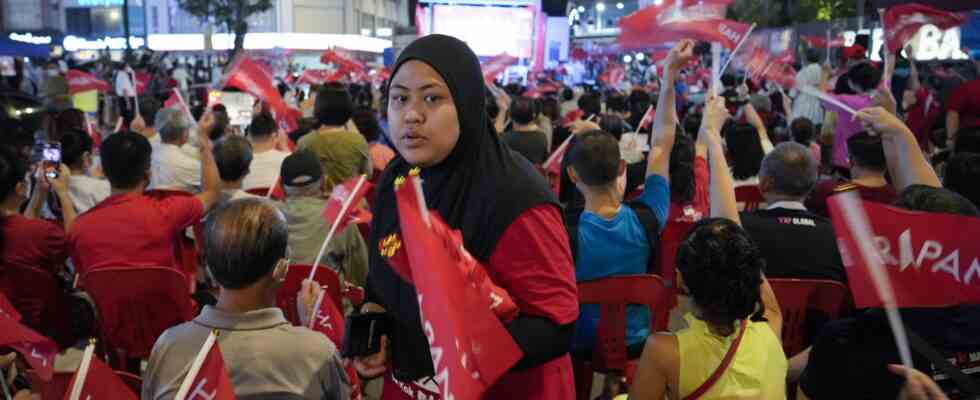Status: 19.11.2022 10:18 a.m
After the last elections in Malaysia there was hope for more plurality, a more mature democracy. But this time the only question seems to be how dominant the old power elites will become again.
Prime Minister Ismail Sabri Yaakob’s party ruled Malaysia for six decades. When she surprisingly lost the elections four years ago, the democratic awakening that many had hoped for did not begin, but rather years of political confusion.
With today’s elections, the United Malays National Organisation, UMNO for short, wants to finally return to the status quo ante and create clear power relations. Ismail Sabri had dissolved parliament prematurely in October. The new elections should take place quickly – before the annual monsoon, which often brings torrential rain.
Three prime ministers since last election
Three prime ministers have led the country since 2018. Very unusual in Malaysia, where since the country gained independence only one party, UMNO, has been in power.
But it fell in the election four years ago over a gigantic corruption scandal involving then Prime Minister Najib Razak. After the defeat, he and his wife were charged – and two years later sentenced to twelve years in prison for embezzling billions of dollars from a sovereign wealth fund.
Almost 30 parties
Almost 30 parties are standing for election. In the multi-ethnic country, many of them try to appeal to specific ethnic groups.
UMNO operates a policy for the largest population group, institutionalized privileges of the Malays over other ethnic groups. But corruption in the party leadership went too far even for this loyal constituency.
A multi-ethnic coalition, the Pakatan Harapan – or Alliance of Hope – benefited from this in the last elections. But that was soon shattered by internal rivalries and defections, fueled by UMNO, which was successful in stoking fears of losing privileges among Malays. This is how UMNO finally came back to power – but only with the help of a shaky and divided coalition.
Things are looking good for UMNO
Ismail Sabri has been prime minister for just over a year and according to polls has a good chance of winning. Critics fear, among other things, that his victory would mean the return of corrupt UMNO cliques. The Alliance of Hope, seen as reform-oriented, is led by opposition veteran Anwar Ibrahim. It has its base among the educated urban middle class.
His predecessor Muhyiddin Yassin is also running for prime minister, albeit as a candidate from the alliance party Perikatan Nasional, which is particularly popular with rural voters.
The oldest candidate for prime minister is Mahathir bin Mohamad. He is 97 years old and had ruled the country for UMNO for a total of 24 years. But now he is running with a newly founded party – which, however, has little chance of success.
It’s about the economy
Political instability, including during the Covid pandemic, and rising inflationary pressures have created major frustrations in society. For many Malaysians, economic development and the rising cost of living are the most important issues before the election – but so is frustration at the political maneuvering of recent years.
Zamri Haron is a livestock and feed trader. Last year he lost his gear and supplies due to heavy rains. In order to pay his workers and continue his business, he had to borrow money. He didn’t get any government help.
Today, Zamri wants to vote for the candidate who will help him to cope with the current economic situation, he tells Reuters. “As traders, we don’t see the government helping us. We expect the candidate who will lead this region to be honest and to help people.”
More young voters than ever before
Today’s elections focus on young voters. Since an electoral reform in 2019, the voting age in Malaysia has been 18 instead of 21. This means that the generation of 18 to 29-year-olds represents the largest group of voters for the first time, and there has never been a higher percentage of first-time voters.
Hajar Wahab is in his early twenties and educates first-time voters about their options and motivates them to cast their votes. This is necessary because many are exhausted due to the country’s political instability, says the student at the Islamic University in Kuala Lumpur. But that’s exactly what should drive the boys to vote, Hajar explains to the Reuters news agency: They should be angry!
election in Malaysia
Jennifer Johnston, ARD Singapore, 11/19/2022 10:21 am

